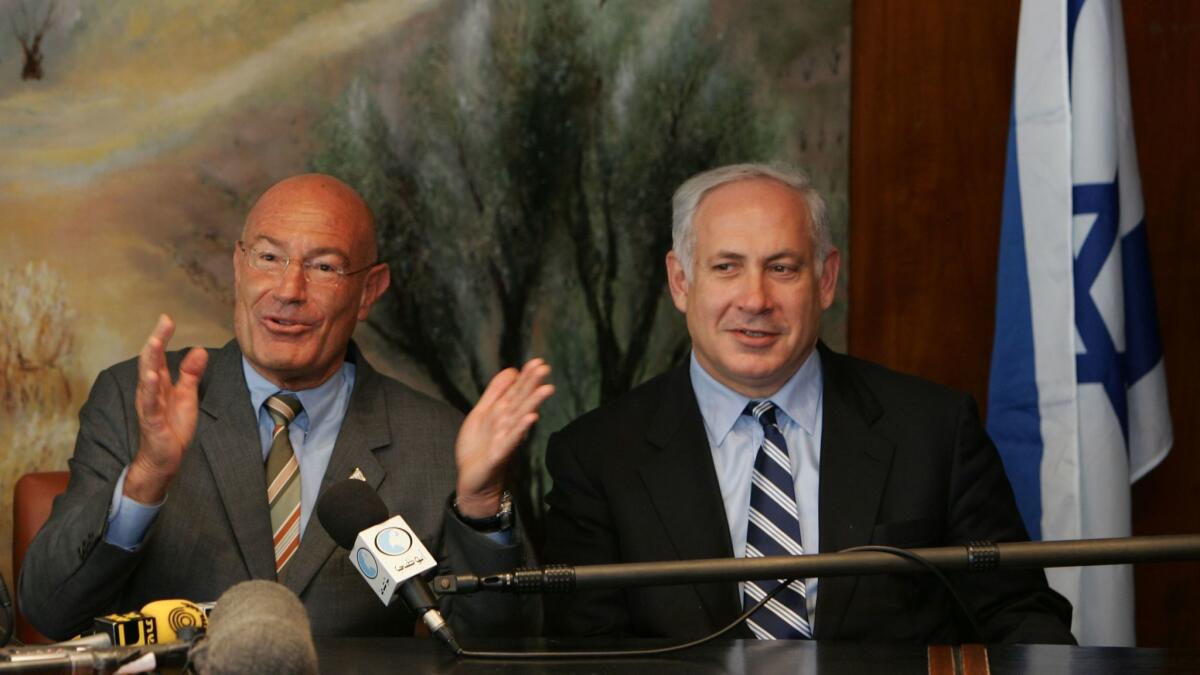Criminal investigation of Israeli Prime Minister Netanyahu could threaten his hold on power

Israeli Prime Minister Benjamin Netanyahu speaks during a news conference at the army division headquarters in the settlement of Bet El, north of Ramallah in the West Bank, on Jan. 10, 2017.
A criminal investigation of Israeli Prime Minister Benjamin Netanyahu that may involve discussion of a secret deal that would benefit him and a newspaper owner and gifts from a Hollywood producer could be serious enough to threaten his hold on power, analysts say.
The corruption investigation involving Netanyahu this week gained intensity when Israeli media reported that a tape exists in which Netanyahu and newspaper owner Arnon Mozes may have been discussing a financial deal for Mozes that involved favorable coverage of Netanyahu.
The prime minister, who denies any wrongdoing, was questioned by authorities twice last week on suspicion of improperly accepting gifts, including a steady supply of high-end Cuban cigars and champagne provided by film mogul Arnon Milchan.
Though Netanyahu and media tycoon Mozes, owner of Yediot Aharonot newspaper, clashed repeatedly in public over the paper’s criticism of the prime minister, police apparently obtained recordings of a conversation in which the two discussed a deal in which Mozes would ensure favorable coverage of the prime minister, according to reports in the Haaretz newspaper and Channel 2 television.
In return, Netanyahu reportedly offered to push legislation to limit the power of Yediot Aharonot’s main rival, Israel Hayom, a free newspaper known for its favorable coverage of the prime minister and owned by U.S. casino magnate Sheldon Adelson.

After years in which the prime minister has been able shake off accusations by the Israeli press about cozy relations with wealthy Israeli and foreign benefactors, the criminal investigation has created a significant possibility that Netanyahu could be charged in the case, analysts said.
Though the prime minister is not legally obliged to step down in the event of an indictment, such a situation would probably trigger overwhelming political and public pressure for his resignation and destabilize his coalition, they said.
“These are the most serious allegations since he first became prime minister,’’ said Avraham Diskin, a political science professor at Hebrew University. “If he’s indicted, it would be an earthquake. Anything would possible, including an early election.’’
Netanyahu has repeatedly denied any wrongdoing and Wednesday told a meeting of politicians from his Likud Party, “Now that I’m aware of all the details, I can say: There will be nothing because there was nothing.’’
In the week since he first faced police questioning, politicians from the Likud Party have come to his defense. His coalition whip, David Bitan, told reporters that he would support Netanyahu remaining in office even if there is a criminal indictment.
Corruption scandals have tainted a string of leading Israeli politicians over the last decade. Former Israeli Prime Minister Ehud Olmert, who is serving a 19-month sentence after being convicted of bribery, stepped down in 2008 before his indictment.
Netanyahu’s coalition government partners have remained mostly silent. But on Tuesday, Israeli Finance Minister Moshe Kahlon, the leader of the center right Kulanu party, signaled a possible break with the prime minister, telling a conference that gifts are appropriate for politicians only at weddings.
Aviv Bushinsky, a former spokesman for Netanyahu, said the negative publicity from the investigation and the distraction of handling the legal case will make it harder for the prime minister to manage the coalition government.
“Netanyahu knows he’s not as strong as he was in dealing with the other parties,’’ Bushinsky said in a phone interview. “It’s not the end of Netanyahu’s career in the short term, but it’s another brick in the wall that is falling apart among people who are fed up with a prime minister that draws so much noise and embarrassing stories.”
According to the media reports, the meetings between Netanyahu and Mozes occurred in late 2014, around the time Netanyahu’s coalition government disintegrated and the prime minister called an early election. The discussions were recorded by Netanyahu’s chief of staff, Ari Harow, and were held at a time when Netanyahu was publicly attacking Mozes repeatedly in social media over Yediot Aharonot’s coverage.
The media reports said that in the recordings, Mozes, whose newspaper had suffered from competition from Israel Hayom, offered to hire journalists of Netanyahu’s choosing. The two also reportedly discussed a law to require that Israel Hayom charge readers for its papers. Despite hours of talks, the negotiations never developed into a deal, according to the reports.
An attorney representing Mozes declined to comment on the reports about the meetings. Jacob Weinroth, the prime minister’s attorney, told reporters Friday he was not worried about the criminal investigation.
“We’re not talking about money and we’re not talking about a loan,’’ Weinroth said.
Some legal commentators have said that even though a deal did not come to fruition, the mere discussion of exploiting the prime minister’s political power in the legislature to gain favorable coverage constitutes an offense.
“This is an invalid connection between a government and newspaper,’’ said Eliyahu Matza, a former Israeli Supreme Court justice in an interview with Israel Radio. “It’s forbidden in every way. This is against journalistic ethics; it’s against democratic values. Is there a criminal element? Yes, I think so.’’
Mitnick is a special correspondent.
More to Read
Sign up for Essential California
The most important California stories and recommendations in your inbox every morning.
You may occasionally receive promotional content from the Los Angeles Times.







